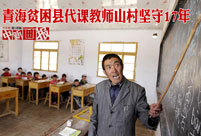 The life of a model: Not as glamorous as it seems
The life of a model: Not as glamorous as it seems
 Hello Kitty, happy 40th birthday!
Hello Kitty, happy 40th birthday!
 The Western Qing Mausoleum
The Western Qing Mausoleum
 Avant-garde approach to graduation photos
Avant-garde approach to graduation photos
 Early PLA posters, signatures of an era
Early PLA posters, signatures of an era
 First Russian Street in Tianjin open to public
First Russian Street in Tianjin open to public
 Motorcycle stunt on the Bund
Motorcycle stunt on the Bund
 French Spiderman Alain Robert climbs up Galaxy Hotel in Macao
French Spiderman Alain Robert climbs up Galaxy Hotel in Macao
 Africans in Guangzhou
Africans in Guangzhou
 Pole dancer shows strength and beauty up in the air
Pole dancer shows strength and beauty up in the air
GUANGZHOU, May 5 -- When Getu Kebede Kidane, 46, opened his own trade company in Ethiopia in March 2013, China was a top choice to find quality suppliers.
"I have high requirements on the quality and diversity of food, clothes and accessories, and I just had to come here," Kidane told Xinhua at the 115th Canton Fair, which concluded Monday in Guangzhou, capital of south China's Guangdong Province, as he glanced at the commodities on display.
The biannual Canton Fair, also known as the China Import and Export Fair, is seen as a barometer of the country's exports.
"Can you put sensors in the shoes to measure speed and distance?" he asked a sports shoe exhibitor. Sports shoes are an instant sell-out in his home country, which has produced a host of long-distance running champions, he explained.
The exhibition has allowed the Ethiopian to envision a bright future in the country. In a step toward enhanced connections with local suppliers, Getu is considering establishing an office in the country he calls "Ethiopia's most important trade partner."
A father of four, Getu said he is "a little old" to wade into an individual business, but he said that the timing is perfect, given that trade between China and Africa is skyrocketing.
Official statistics show that the trade turnover between the two surged to 210 billion U.S. dollars at the end of 2013, 21 times that of the year 2000, when the Forum on China-Africa Cooperation was just beginning.
The fair saw businessmen from a variety of African countries, including Zambia, Tanzania and Uganda. A total of 17,441 business people from the continent attended the event, a year-on-year increase of almost 30 percent.
Liu Jianjun, deputy director of the China Foreign Trade Center and spokesman of the fair, said that the number of African purchasers has always been stable over the years, which is an encouraging trend amid a slow recovery of the global economy.
Ignatius David Kiwanuka, who works for the Beijing Chen'ao Coffee Co., Ltd., a Sino-African joint venture, said that the company is taking pains to tap the potential of the Chinese market for the quality Ugandan coffee they produce.
"Most Chinese consumers have no idea of Ugandan coffee due to a dearth of promotion," said Kiwanuka, the company's representative at its Guangzhou office.
African business people like Kidane and Kiwanuka are expected to make inroads into the Chinese market, as Premier Li Keqiang kicked off an eight-day visit to Africa.
Cai Chunlin, head of the Guangdong Emerging Economics Society, said that Li's visit to Africa will prompt a spike in China-African cooperation.
"If policies are effective enough, the trade turnover between the two could double in five years' time," Cai said, echoing the premier, who said that China expects trade with Africa to reach 400 billion U.S. dollars by 2020.
And people like Kidane have high hopes for such cooperation.
"I hope for easier visa applications and more tax-free policies," he said, adding that more Chinese companies could open factories in Africa, where affordable labor is easily available and more jobs could be generated.
CHANCES AMID TRADE SLOWDOWN
So far, more than 2,500 Chinese companies have invested in Africa, and total indirect investment has reached 25 billion U.S. dollars, according to government statistics.
Chinese companies are seeking opportunities in the emerging market as a way out of the sluggish trade situation, as seen in the dropping turnover of the just-concluded Canton Fair.
Fair organizers said this session saw fewer buyers and trade deals. Export volume dropped 12.64 percent year on year to 191.18 billion yuan (31.05 billion U.S. dollars), and was down 2.01 percent from the last session.
Chinese exporters are facing many challenges, including higher labor and material costs, a tough economic situation and increasing turbulence in some regions, Liu Jianjun said.
According to customs statistics, China's total foreign trade volume in March was 332.5 billion U.S. dollars, down 9 percent year on year. Exports last month fell 6.6 percent year on year to 170.11 billion U.S. dollars, while imports were down 11.3 percent to 162.41 billion U.S. dollars.
Against this backdrop, some firms have pinned their hopes on the depreciation of the yuan and expect more direct support from the government.
However, more are seeking potential overseas markets rather than stimulus from currency devaluation.
"As a multinational, we have to transport Thailand-made products to Europe, or bring goods from Indian factories to Africa, which means we cannot simply count on the depreciation of the RMB," said Sun Shubao, marketing director of Haier in Europe.
China has set this year's target of economic growth at about 7.5 percent. But growth in Q1 is set to be below the yearly target.
But Liu is not all doom and gloom, saying the nation has been focusing on the strengths of exporters and that "policies to stabilize growth and adjust the economic structure are being implemented."
In April, a slew of policies were issued at an executive meeting of the State Council, China's cabinet, to further optimize policies on foreign trade, finance and taxes.
These preferential policies have promised more room for Chinese players to enter the African market. And more Chinese companies are jumping on the bandwagon.
The Hubei Fuxilai Furniture Co., Ltd. in the central province of Hubei is building a direct selling company in Nigeria this year.0 "Despite high costs in the initial stages, a direct selling company will help us rake in more benefits in the long run, because it is closer to the African market, and will have a quicker market response," said Wang Yaobin, the company's general manager.
Cai Chunlin urged Chinese companies to pay more attention to project quality, sustainable development and social responsibilities when tapping the African market.P "Chinese companies should share experience with their African counterparts in terms of business models and operation concept so that the local people can feel the boon of bilateral cooperation," Cai said.
He added that the Chinese government could map out tie-up programs with Africa, particularly in the automobile, machinery and mining sectors.
"The Chinese government should encourage more African students, entrepreneurs and local government workers to come to China for study and training to boost exchanges," the expert said.
 Solar halo occurs in Lhasa
Solar halo occurs in Lhasa High fashion trend welcomed by costumers in Changsha
High fashion trend welcomed by costumers in Changsha 17 years' teaching life in a remote village in Qinghai
17 years' teaching life in a remote village in Qinghai Beautiful Chinese-built roads in Africa
Beautiful Chinese-built roads in Africa The Western Qing Mausoleum
The Western Qing Mausoleum Overseas returnees strive for dreams in Beijing
Overseas returnees strive for dreams in Beijing Fried up: Chili pork bonanza in Central China
Fried up: Chili pork bonanza in Central China Hand-painted maps go viral online
Hand-painted maps go viral online 4th Beijing Int'l Film Festival ends
4th Beijing Int'l Film Festival ends 'African Street' in Guangzhou
'African Street' in Guangzhou Special operation members in comprehensive training
Special operation members in comprehensive training Cute Shaolin boy melts the hearts of millions
Cute Shaolin boy melts the hearts of millions Giant panda Sijia is back to happy life
Giant panda Sijia is back to happy life Richest Chinese of 2014: half from the mainland
Richest Chinese of 2014: half from the mainland Chengdu - laid-back lifestyle makes happiest city
Chengdu - laid-back lifestyle makes happiest cityDay|Week|Month